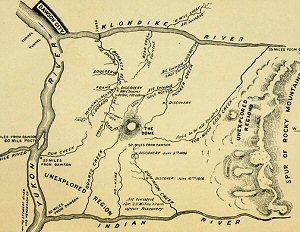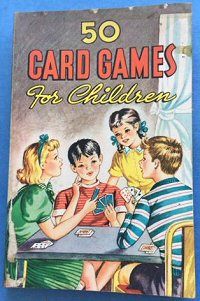Speculative history of Yukon, the once supremely popular Canadian card game of Northern European Descent.

If you were taught the rules of Yukon by a parent, grandparent or otherwise older relative or friend of the family, count yourself among the fortunate few. Most of today’s players were educated by card gaming books or internet websites (much like this one).
Yukon is such an old game by Canadian historical measures, with a regionally-restrictive range of popularity, that relatively few families still pass the game down through the generations. Thankfully, it has not faded into history, and is still quite popular among certain crowds.
Speculative History of the Roots of Yukon in Canada
Why speculative, you ponder? Unfortunately, the precise history of this card game has become muddled over the last century. Some facts are still known, while others we must speculate out of necessity, utilizing educated guesses and outsourcing information to piece together the most believable origins of the game.

What we do know is that the earliest mention of Yukon, by that name and the rules we enforce today, appeared in Vernon Quinn’s 1933 publication of ‘50 Card Games for Children‘. Within this book, Quinn asserts that Yukon can be traced back to an old German card game that was popularized in North America during the Gold Rush era.
As history buffs may know, the California Gold Rush of 1848-1855 brought a surge of people from the eastern United States, which was already made up of an amalgamation of people from every corner of the globe. This eventually led to people of all nationalities stampeding northward towards Alaska and the Yukon to partake in the Klondike Gold Rush of 1897-1899. At the same time, the people of Canada, who were largely made up of northern Europeans, packed their bags and hoisted all the tools they could manage, heading in the same direction.
Somewhere within all these masses were people of Danish, Norwegian and Swedish decent, who brought to the mines a pastime they called Gold Digger. Of course, in their respective languages, it was called Guldgraverne (Danish), Gullgravere (Norwegian) or Guldgrävare (Swedish).
The rules of Gold Digger are undeniably similar to the game of Yukon described in Quinn’s book. The only differences are the value of standard Yukon Jacks (11 points each); the Ace being the lowest ranking card, below 2 (King being highest after Jack); and the breaking of a tie in points being dependent on the player/team that captured the Ace of Spades in the final hand.

It certainly seems presumable, based on all this evidence, that Yukon is a direct descendant of the Gold Digger card game played during the Klondike Gold Rush of the late 19th century. The fact that the descending game’s name became “Yukon” should come as no surprise, either, since that’s where the majority of Canadians did their mining over the following years. And must we consider it a coincidence that the Jacks are trump?
The tale of Leroy Napoleon “Jack” McQuesten (1836-1909) is well known throughout Canada. Jack McQuesten was a famous trader, prospector, explorer and pioneer of the Yukon Territory. He had many nicknames throughout his years, but none so famous as “Yukon Jack”. His is, in fact, the person for which the famous Canadian whiskey, Yukon Jack (aka “The Black Sheep of Canadian Liquors”) was named. I wouldn’t be shocked if the card game, and its equivalent trump, were derived from his famous adventures.
Speculative History of How Yukon Spread Throughout Canada
As the Gold Rush subsided and miners settled into more permanent communities, Yukon likely evolved to suit local tastes and preferences. The game may have spread through mining camps, saloons, and frontier towns… with each region adding its own twist to the rules.
As stories of gold seekers and adventurers captured the imagination of people across Canada, Yukon may have become a symbol of the northern frontier experience.
It’s possible that returning miners brought the game back to their hometowns, spreading it across Canada. This could explain why Yukon remained popular in certain regions, particularly those with strong connections to the Gold Rush era.
The game’s unique rules, combining elements of trick-taking and point-scoring, may have appealed to card players looking for a new challenge. This could have contributed to its enduring popularity among dedicated card game enthusiasts.
Now the Cold Hard Facts
Since we started with pure speculation, let’s list some cold hard facts now, for those who want to “dig a little deeper” (pun intended):
- Yukon is a multiplayer card game, distinct from the single-player Yukon Solitaire.
- Yukon shares similarities with Scandinavian games, suggesting a possible evolution from these earlier card games.
- The game’s name likely derives from its association with the Yukon Territory, the home of the Klondike Gold Rush.
- Yukon features unique gameplay elements, including special “Yukon” cards (Jacks) and a distinctive scoring system.
- The game remains popular in certain regions of Canada, particularly those with strong Scandinavian heritage.
- Despite its regional popularity, Yukon is relatively unknown in many parts of the world, even among card game enthusiasts.
Closing Words
The game’s association with “Yukon Jack” McQuesten and the famous whiskey named after him may have further mythologized its origins, adding to its allure and mystique among players.
While Yukon’s popularity may have waned in some areas, its persistence in certain Canadian communities suggests a deep-rooted cultural significance.
As we finish piecing Yukon’s history, it becomes clear that this card game is more than just a pastime – it’s a living piece of Canadian heritage, connecting players to the country’s adventurous past and the enduring spirit of the North.
Note: We will update this article, with links to Yukon rules, variations, and strategy, so our readers get the complete picture.





